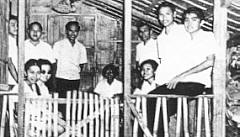
"The Way We Were"
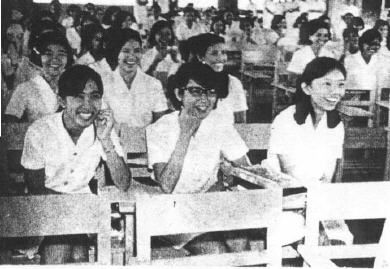
 |
"The Way We Were" |
 |
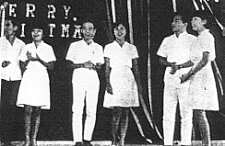 "Those were the days, my friend.."
"Those were the days, my friend.."
This Web site is design not just for information, but to try to take the members of the CIM class 1972 back to the most intense dreams and wonderful time of their life; to the days they thought would never end...to the way they were...to catch the twinkling vibration...to live in the afterglow of yesteryears. So "wrap your troubles in dream, and dream your troubles away," goes the lyric of a jazz song.
"It was a very good year.."
Nineteen seventy-two is a memorable year for those who graduated from the medical school in the Philippines during that year. For it is this year that produced the first medical graduates of the new 4-year medical school curriculum. The curriculum was shortened from 5 years to 4 years. Therefore, two classes graduated during this year: one from the 5-year curriculum, the other from the 4-year curriculum. Suffice it to say that many students marched during this year to receive their M.D. diploma. For both classes, "it was a very good year."
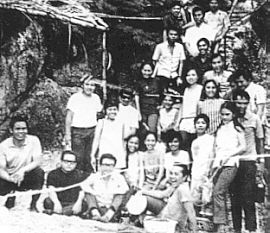 Many of the CIM 1972 graduates were able to come to the U.S. for their residency training and most, if not all of them, ultimately settled in the U.S. It was not because there were relatively many of them to begin with, but many of them passed the ECFMG exam, the U.S. requirement for foreign graduates to come to the U.S. for further medical training. This particular exam was notorious for frequently failing more than 80% of those who took it. But the CIM graduates of 1972 were eager, aggressive, optimistic and enthusiastic to carve their own future in the practice of medicine. They were a lot smarter, and they knew exactly what they wanted in life. What some of them lacked in brains, they compensated it by having the guts to go against the grain. They had ego, temper, and patience. And they understood that nothing worth anything in life would come easily. So they worked hard. They gave everything they did a hard, honest effort. Yet they never lose their great sense of humor. Every time they get together like in the yearly CIM Alumni reunion, one could sense like they just want to talk, joke and laugh the night away. The place they meet would echo with laughter.
Many of the CIM 1972 graduates were able to come to the U.S. for their residency training and most, if not all of them, ultimately settled in the U.S. It was not because there were relatively many of them to begin with, but many of them passed the ECFMG exam, the U.S. requirement for foreign graduates to come to the U.S. for further medical training. This particular exam was notorious for frequently failing more than 80% of those who took it. But the CIM graduates of 1972 were eager, aggressive, optimistic and enthusiastic to carve their own future in the practice of medicine. They were a lot smarter, and they knew exactly what they wanted in life. What some of them lacked in brains, they compensated it by having the guts to go against the grain. They had ego, temper, and patience. And they understood that nothing worth anything in life would come easily. So they worked hard. They gave everything they did a hard, honest effort. Yet they never lose their great sense of humor. Every time they get together like in the yearly CIM Alumni reunion, one could sense like they just want to talk, joke and laugh the night away. The place they meet would echo with laughter.
But as much as they take from this world, they never forget to give back. Many of them are doing charitable works regularly in many poor countries in the world although they often do it in the Philippines. Dr. Mike Espiritu, for example, who is a board-certified ophthalmologist, periodically travels to Ecuador, Bolivia and other third world countries mostly at his own expense to provide eye surgeries to the indigents, and to teach these countries' medical students and resident physicians his surgical skill. To him, the emotional and spiritual reward is more than anything he could have asked for. And to see the smiling faces of his grateful patients who would come just to greet him, makes him feel like he has contributed something significant to humanity.
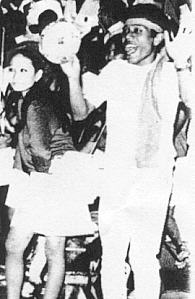 The Urge and The Rare Bunch
The Urge and The Rare Bunch
Like other young men and women anywhere in the world, in the 1960s and 70s, many CIM students of the class 1972 formed themselves into groups and they named the group they belonged to. One group called themselves, The Urge. For some reason, members of this group had many urges few of which they had a hard time controlling. It was unfortunate that a couple of these few urges that some of them often had were to burp and to fart. They would just let go of these urges, not for malice but as a way of reminding themselves as well as everyone that humans have weaknesses one of which is the inability to control an urge.
The other group called themselves, The Rare Bunch, not because they thought they came from a rare specie of the Homo sapiens, nor they believed that they had a rare designer gene and thus endowed with something special, but because early in life, they understood that life should not be taken too seriously. They came to school not just to study and learn, but also to have some fun. When one or few of them flunked an exam, they never worried about it. Yet they were competitive. But their concept of competition was not to beat others, but to achieve. They would recover readily from flunking an exam to get a passing grade average or even better, than they would from the pain of a Penadur shot. They never lost sight at what they needed to do. Yet to them, the risk of satisfying their curiosity was always worth the roll. They would simply joke and laugh away the painful result of their youthful indiscretion. But they would savor its pleasurable experience for quiet some time. When a situation would call for, they would be ready to become rough, to become tough, and to take no crap from anyone. That's why they called themselves, The Rare Bunch.


 |